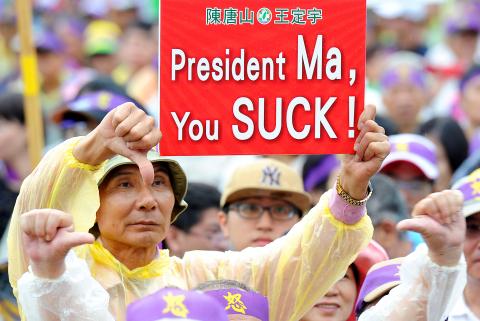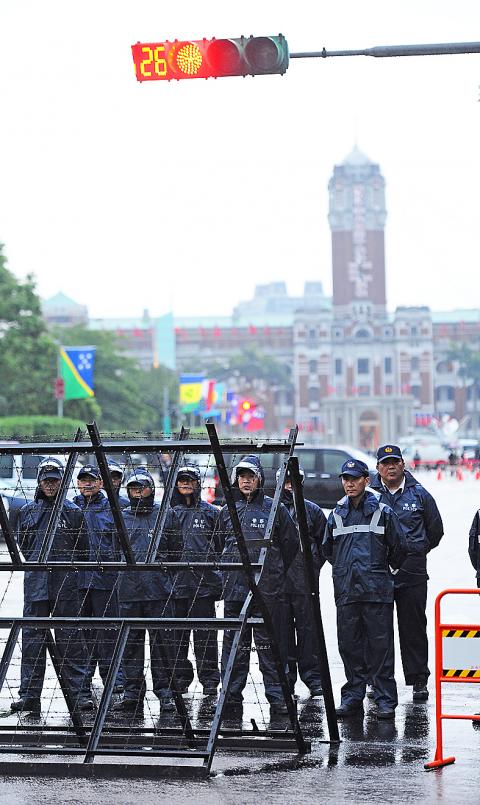Tens of thousands of people called for President Ma Ying-jeou (馬英九) to apologize for his poor performance over the past four years on the eve of his re-inauguration yesterday in a mass protest in Taipei that took place amid intermittent rain.
The Democratic Progressive Party (DPP), which organized the rally, estimated that about 150,000 people took part in the protest, which marched under the banner: “Hard times: The president owes the public an explanation.”
“We do not ask much. We are only asking for a responsible president who will defend Taiwan’s sovereignty and democracy and an efficient government,” former DPP chairperson Tsai Ing-wen (蔡英文) said at a rally held at the intersection of Beiping E Road and Linsen N Road to conclude the night.

Photo: AFP
The former presidential candidate apologized to the supporters for losing the Jan. 14 presidential election, but asked them not to blame those who voted for Ma because “when a country sinks, we all go down together.”
Taiwanese should unite and lift the nation up, she said.
Tsai also submitted a four-point statement in response to an impromptu press conference Ma held yesterday afternoon at which he acknowledged public discontent and promised to work to do better during his second term.

Photo: Liu Hsin-de, Taipei Times
Tsai urged Ma to refrain from making unilateral decisions and using major policies, such as the government’s cross-strait policy, as political tools. She said it was time for Ma to be a responsible leader and to carry out a comprehensive reshuffle of the Cabinet.
Yesterday’s protest, which focused on a number of unpopular policy decisions made by the government since Ma was re-elected four months ago, made three demands: that the president freeze fuel and electricity prices, retain the ban on beef imports containing the animal feed additive ractopamine and disavow the description of cross-strait relations as being between “one country, two areas (一國兩區).”
The protests started in the afternoon, with protesters assembling at three different locations in the city: National Taiwan University (NTU), Wanhua Railway Station and the Songshan Tobacco Plant.
People First Party Chairman James Soong (宋楚瑜), who it had been hinted might make a surprise appearance, did not show up.
Instead it was Tsai, in charge of leading protesters from NTU, who attracted the most attention, despite not currently holding any position in the party.
Protesters had waited about 10 minutes at NTU when it began to drizzle and quickly turned into pouring rain that soaked everyone in seconds, but their spirits were soon lifted by Tsai’s arrival.
Dozens of people chanted: “Hello, President” as the former party chairperson arrived, while dozens tried to get as close as they could to take pictures and shake hands with her.
Taiwanese should no longer be silent, Tsai said before the march began, urging people to make their voices heard.
“If you remain silent, what you are experiencing these days will become what you have to put up with for the next four years,” she said.
Ma needed to do more than just apologize, Tsai said, adding that he needed to recognize the mistakes he had made and correct them.
The three groups of protesters converged at their destination point at about 5:30pm, with DPP Acting Chairperson Chen Chu (陳菊) and former premier Su Tseng-chang (蘇貞昌) leading the other marches.
Many of the protesters dressed in purple and yellow, the colors chosen for the rally, with purple representing the oppressed and yellow public anger.
Speakers representing students, pig farmers, academics and housewives spoke on stage about how their lives had changed for the worse under Ma before politicians from the DPP and Taiwan Solidarity Union (TSU) addressed the crowd.
Hsu Shih-jung (徐世榮), a professor at National Cheng Chi University, said the government had betrayed the people in many ways, particularly in its implementation of land expropriation.
The rally was the highlight of a string of anti-Ma protests over the past week, but the demonstrations did not end last night.
Some said they would stay overnight at Taipei Railway Station and then take part in a TSU-sponsored protest scheduled for today, in which protesters will march to the end of Chongqing S Rd and get as close as possible to the Presidential Office to throw eggs at a giant LCD screen showing Ma’s inauguration.
Meanwhile, DPP branches nationwide are set to hold a number of activities today as a continuation of the party’s protest against Ma.
According to the Taipei police, more than 1,500 police officers were deployed yesterday to maintain security during the protest, while another 1,960 police officers were on standby. Police estimated 55,000 people took part in the rally.
Additional reporting by Rich Chang and Chiu Chun-fu
This story has been updated since it was originally published.

The CIA has a message for Chinese government officials worried about their place in Chinese President Xi Jinping’s (習近平) government: Come work with us. The agency released two Mandarin-language videos on social media on Thursday inviting disgruntled officials to contact the CIA. The recruitment videos posted on YouTube and X racked up more than 5 million views combined in their first day. The outreach comes as CIA Director John Ratcliffe has vowed to boost the agency’s use of intelligence from human sources and its focus on China, which has recently targeted US officials with its own espionage operations. The videos are “aimed at

STEADFAST FRIEND: The bills encourage increased Taiwan-US engagement and address China’s distortion of UN Resolution 2758 to isolate Taiwan internationally The Presidential Office yesterday thanked the US House of Representatives for unanimously passing two Taiwan-related bills highlighting its solid support for Taiwan’s democracy and global participation, and for deepening bilateral relations. One of the bills, the Taiwan Assurance Implementation Act, requires the US Department of State to periodically review its guidelines for engagement with Taiwan, and report to the US Congress on the guidelines and plans to lift self-imposed limitations on US-Taiwan engagement. The other bill is the Taiwan International Solidarity Act, which clarifies that UN Resolution 2758 does not address the issue of the representation of Taiwan or its people in

US Indo-Pacific Commander Admiral Samuel Paparo on Friday expressed concern over the rate at which China is diversifying its military exercises, the Financial Times (FT) reported on Saturday. “The rates of change on the depth and breadth of their exercises is the one non-linear effect that I’ve seen in the last year that wakes me up at night or keeps me up at night,” Paparo was quoted by FT as saying while attending the annual Sedona Forum at the McCain Institute in Arizona. Paparo also expressed concern over the speed with which China was expanding its military. While the US

SHIFT: Taiwan’s better-than-expected first-quarter GDP and signs of weakness in the US have driven global capital back to emerging markets, the central bank head said The central bank yesterday blamed market speculation for the steep rise in the local currency, and urged exporters and financial institutions to stay calm and stop panic sell-offs to avoid hurting their own profitability. The nation’s top monetary policymaker said that it would step in, if necessary, to maintain order and stability in the foreign exchange market. The remarks came as the NT dollar yesterday closed up NT$0.919 to NT$30.145 against the US dollar in Taipei trading, after rising as high as NT$29.59 in intraday trading. The local currency has surged 5.85 percent against the greenback over the past two sessions, central